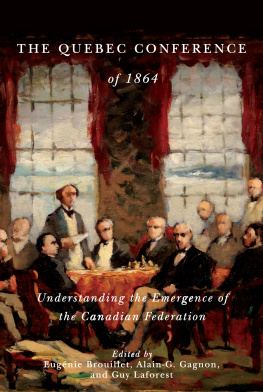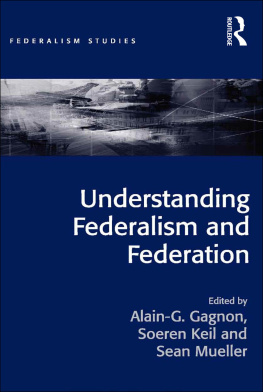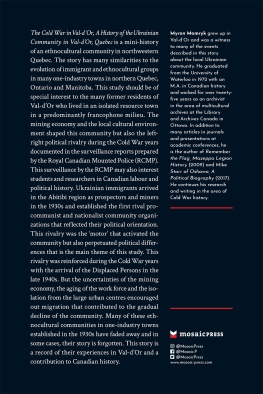
THE QUEBEC CONFERENCE OF 1864
The Quebec Conference of 1864
Understanding the Emergence of the Canadian Federation
Edited by
Eugnie Brouillet, Alain-G. Gagnon, and Guy Laforest
McGill-Queens University Press
Montreal & Kingston London Chicago
McGill-Queens University Press 2018
First published in French as La Confrence de Qubec de 1864, 150 ans plus tard:
Comprendre lmergence de la fdration canadienne by Presses de lUniversit Laval, 2016
ISBN 978-0-7735-5480-1 (cloth)
ISBN 978-0-7735-5481-8 (paper)
ISBN 978-0-7735-5604-1 (ePDF)
ISBN 978-0-7735-5605-8 (ePUB)
Legal deposit fourth quarter 2018
Bibliothque nationale du Qubec
Printed in Canada on acid-free paper that is 100% ancient forest free
(100% post-consumer recycled), processed chlorine free
We acknowledge the support of the Canada Council for the Arts, which last year invested $153 million to bring the arts to Canadians throughout the country.
Nous remercions le Conseil des arts du Canada de son soutien. Lan dernier, le Conseil a investi 153 millions de dollars pour mettre de lart dans la vie des Canadiennes et des Canadiens de tout le pays.
Library and Archives Canada Cataloguing in Publication
The Quebec Conference of 1864 : understanding the emergence of the Canadian federation / edited by Eugnie Brouillet, Alain-G. Gagnon, and Guy Laforest.
Includes bibliographical references and index.
Issued in print and electronic formats.
ISBN 978-0-7735-5480-1 (cloth).ISBN 978-0-7735-5481-8 (paper).ISBN 978-0-7735-5604-1 (ePDF).ISBN 978-0-7735-5605-8 (ePUB)
1. Qubec Conference (1864 : Qubec, Qubec). 2. Fathers of Confederation. 3. Canada History Confederation, 1867. I. Brouillet, Eugnie, 1973 , editor II. Gagnon, Alain-G. (Alain-Gustave), 1954, editor III. Laforest, Guy, 1955, editor
FC476.Q84 2018 | 971.04'9 | C2018-904959-6 C2018-904960-X |
Contents
Eugnie Brouillet, Alain-G. Gagnon, and Guy Laforest
Rachel Chagnon
Marc Chevrier
Phillip Buckner
ric Bdard
Guy Laforest and Flix Mathieu
Christopher Moore
Paul Romney
Franois Rocher
Louis-Georges Harvey
Stphane Kelly
Yvan Lamonde
Andr Burelle
Robert C. Vipond, Jacqueline D. Krikorian, and David R. Cameron
Claude Couture
Anne Trpanier
THE QUEBEC CONFERENCE OF 1864
INTRODUCTION
1864, a Pivotal Year in the Advent of the Canadian Confederation
EUGNIE BROUILLET, ALAIN-G. GAGNON, AND GUY LAFOREST
The great events of our history merit being remembered and better understood. It seems to us that the academic humanities and social sciences community must feel called to the front line in any great design to revive historical memory. Naturally, such an undertaking can only be multidisciplinary: it has to mobilize law, philosophy, sociology, history, and political science, all equally. In Quebec, and in a bilingual country like Canada, this approach will be expressed with much more legitimacy if it gives roughly equal importance to the French-speaking intellectual milieu and its English-speaking counterpart. These are the principles that have inspired the authors of this introduction from the first moment, when, around five years ago, we decided to join forces and pool ideas to create a research program aimed at interpreting this key period in Canadian political history that spans the formation of an expanded government the cabinet of the Great Coalition in United Canada in June 1864 to the entrance into effect of the Constitution Act, 1867 in July 1867.
From 16 to 18 October 2014, the Groupe de recherche sur les socits plurinationales (GRSP) and the Centre de recherche interdisciplinaire sur la diversit et la dmocratie (CRIDAQ), directed by Alain-G. Gagnon from the Universit du Qubec Montral (UQAM), in collaboration with the Universit Laval Faculty of Law, directed by Eugnie Brouillet, held a three-day colloquium
A few words about the transition to the 1867 constitutional order seem essential to understanding the place that French Canadians would come to have in the new political regime. The historian Stanley Ryerson probably best grasped the economic, political, and social stakes involved in this regime change. According to him, French Canadians efforts to keep and strengthen their national identity required official recognition, no matter what form of state one wanted to create. That aspiration, however, clashed with the manoeuvres of certain groups in both London and English Canada, the primary concern of which was to ensure British domination over the French, that conquered people.
The proposed new union did not rely on either binationalism or national pluralism. More broadly defined, this means that the First Nations were not given any concrete power. Ryerson was very critical of the advent of the Canadian Confederation in 1867. He was of the opinion that the mistake of the artisans of federalism in 1867 was to have set aside the binational reality. Their efforts to reduce the nation to a narrow religious and linguistic particularism, their refusal to consider it as an organic entity in which the cultural element could not be detached from the socio-economic context, prevented them from having to imagine an authentic binational federation founded on both peoples rights to complete self-determination.
From this perspective, the new constitutional regime in Canada was not established on some egalitarian foundation, given the long-term
It is therefore important to introduce a few socio-economic considerations to get a better grasp of the period of transition from the United Province of Canada to the establishment of the British North America Act, and highlight the significance of the economic interests at stake. John A. Macdonald and Alexander Galt, two of the leading figures, represented English-Canadian business communities based in Montreal, while George Brown styled himself the representative of the commercial and industrial interests of Toronto and of reformers from the Canadian West. George-tienne Cartiers role flowed more from his ability to gather the support of the conservative wing of the French-Canadian bourgeoisie and the Church, allies of English-Canadian capital. In short, the fact that the political project became concrete depended a great deal on a convergence of economic interests, which were crucial to the new political institutions being adopted.
We will not overlook the evolution of the major interpretative trends from 1864 to 1967, that pivotal period in the history of the British North American colonies. For those who would prefer to situate this in broader interpretations of the history of Quebec and Canada, we have a few suggestions for complementary reading below.
However, we would regret it if we did not draw more attention to a few key aspects of this political history since doing so reveals different visions, as it reveals tension between one approach conducive to the federalization of the Canadian territory, and another approach more inclined to promoting national unity. The dominant vision could at best barely tolerate diversity, whereas this was the cornerstone of the main proponents within the French-Canadian school. The latter was banking on the promotion of differentiated identities within the two main national communities. A review of English-Canadian historiography reveals little interest in recognizing a pact between the founding nations. An illustration of this can be found in Frank Underhills description of the pact as a modern Laurentian fantasy.
Next page








